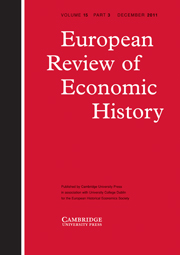Crossref Citations
This article has been cited by the following publications. This list is generated based on data provided by
Crossref.
Fohlin, Caroline M.
2000.
Banking Industry Structure, Competition, and Performance: Does Universality Matter?.
SSRN Electronic Journal,
Fohlin, Caroline M.
2001.
Regulation, Taxation, and the Development of the German Universal Banking System, 1884-1913.
SSRN Electronic Journal,
Fohlin, Caroline M.
2001.
Economic, Political, and Legal Factors in Financial System Development: International Patterns in Historical Perspective.
SSRN Electronic Journal ,
Becht, Marco
Bolton, Patrick
and
Röell, Ailsa
2003.
Corporate Finance.
Vol. 1,
Issue. ,
p.
1.
Burhop, Carsten
2006.
Did banks cause the German industrialization?.
Explorations in Economic History,
Vol. 43,
Issue. 1,
p.
39.
Becht, Marco
Bolton, Patrick
and
Röell, Ailsa
2007.
Vol. 2,
Issue. ,
p.
829.
Piluso, Giandomenico
2010.
From the universal bank to the universal bank: a reappraisal.
Journal of Modern Italian Studies,
Vol. 15,
Issue. 1,
p.
84.
Pistoresi, Barbara
and
Rinaldi, Alberto
2012.
Exports, imports and growth.
Explorations in Economic History,
Vol. 49,
Issue. 2,
p.
241.
Drago, Carlo
Ricciuti, Roberto
Rinaldi, Alberto
and
Vasta, Michelangelo
2013.
A Counterfactual Analysis of the Bank-Industry Relationship in Italy, 1913-1936.
SSRN Electronic Journal,
De Bonis, Riccardo
and
Silvestrini, Andrea
2013.
The Italian Financial Cycle: 1861-2011.
SSRN Electronic Journal,
De Bonis, Riccardo
and
Silvestrini, Andrea
2014.
The Italian financial cycle: 1861–2011.
Cliometrica,
Vol. 8,
Issue. 3,
p.
301.
COLLI, ANDREA
and
RINALDI, ALBERTO
2015.
Institutions, Politics, and the Corporate Economy.
Enterprise & Society,
Vol. 16,
Issue. 2,
p.
249.
Vasta, Michelangelo
Drago, Carlo
Ricciuti, Roberto
and
Rinaldi, Alberto
2017.
Reassessing the bank–industry relationship in Italy, 1913–1936: a counterfactual analysis.
Cliometrica,
Vol. 11,
Issue. 2,
p.
183.
Timini, Jacopo
2018.
The Margins of Trade: Market entry and Sector Spillovers, The Case of Italy (1862-1913).
SSRN Electronic Journal,
Rinaldi, Alberto
and
Spadavecchia, Anna
2021.
The banking-industry relationship in Italy: large national banks and small local banks compared (1913–1936).
Business History,
Vol. 63,
Issue. 6,
p.
988.
García-Ruiz, José L.
and
Vasta, Michelangelo
2021.
Financing firms: Beyond the dichotomy between banks and markets.
Business History,
Vol. 63,
Issue. 6,
p.
877.
Timini, Jacopo
2021.
The drivers of Italian exports and product market entry: 1862–1913.
European Review of Economic History,
Vol. 25,
Issue. 3,
p.
513.
Epaphra, Manamba
and
Kiwia, Brenda P.
2021.
Financial literacy and participation in the financial markets in Tanzania: An application of the logit regression model.
Journal of Economic and Financial Sciences,
Vol. 14,
Issue. 1,
Jopp, Tobias A.
and
Spoerer, Mark
2024.
Handbook of Cliometrics.
p.
231.
Jopp, Tobias A.
and
Spoerer, Mark
2024.
Handbook of Cliometrics.
p.
1.




